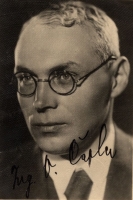Čapla, Vasil – Materials from Personal Inheritance
Vasil Čapla (based on his birth and baptismal certificate Basilius Čapla/Czapla, in Ukrainian Vasyl Petrovych Chaplia; 20 June 1891 – 16 August 1977) was a Czechoslovak pedagogue of Ukrainian origin, an expert in accounting and cybernetics, and a political prisoner of the Soviet Gulag.
He was born in the village of Yasenytsya-Silna in Galicia (now in the Drohobych district, Lviv region, Ukraine) into a peasant family. From childhood, he was close to Galician Ukrainian Enlightenment circles, because his cousin was the poet, literary critic and prominent political activist Ivan Franko (1856–1916).
Čapla attended the municipal school and then for two years the Polish secondary grammar school in Drohobych. He completed his secondary school studies in Cracow. In 1912, he passed his school-leaving exam and began working as a teacher at the national (elementary) school in the Zholkev district. After the first school year, he volunteered for one year of the basic military service. He continued his military career even after the outbreak of First World War: in 1916, he held the rank of senior lieutenant in the Austrian army. In 1918, he fell into Italian captivity. After his release in 1919, he settled in Prague, where he graduated from the College of Business. In 1922, he began teaching at the State Commercial Academy ‘with Ruthenian and Ukrainian as the languages of instruction’ in Uzhhorod, which was transferred to Mukachevo in 1926. He worked there until 1938, when he transferred to the Ministry of Education of Subcarpathian Rus’ as a senior desk officer and school inspector. After the occupation of the region by Hungary in 1939, he and his family (his wife Eliška and children Eva and Jiří) left for Prague.
In Prague, Vasil Čapla became an associate professor at Ukrainian Free University; in 1939–1942, he was the director of the two-year business school for girls in Ječná Street in Prague. Afterwards, until the end of the war, he taught at the secondary business school in Resslova Street, Prague. While working at secondary vocational schools, he wrote a number of accounting textbooks.
Shortly after the arrival of the Red Army in Prague, on 15 May 1945, Čapla was arrested by members of the NKVD and deported to the USSR. On 8 April 1946, he was sentenced by a military tribunal for alleged counter-revolutionary activities to ten years in forced labour camps. He returned to Czechoslovakia after his release from Mordovia in 1954. He was rehabilitated on 18 March 1964 by a decision of the Kiev Regional Court.
Ing. Vasil Čapla died on 16 August 1977 in Prague and was buried there.
After Vasil Čapla retired in 1955, he began to study cybernetics, especially its history. Already in 1964, he published his first work on the subject and actively sought to establish professional and personal contacts in Soviet Ukraine.
The small collection of documents from Čapla’s personal estate mainly contains materials related to his biography, biographical texts and photographs from 1917–1977 (both originals and copies). It also includes manuscripts of some of Čapla’s studies, especially on the development of computer technology in Czechoslovakia and on the history of cybernetics in general. The collection of Vasil Čapla’s documents was donated to the Slavonic Library by his son Jiří Čapla.
